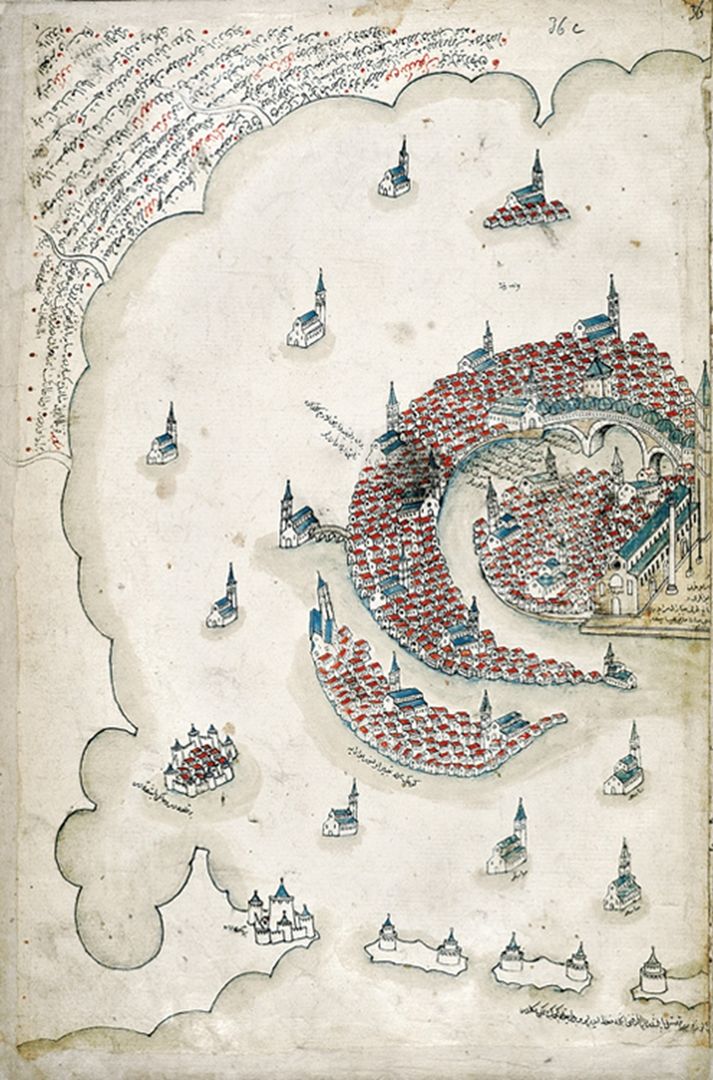
The Interviewees

Interview with Vera Constantini - July 2023
1- In the early Middle Ages there were a whole host of maritime cities along to North coast of the Mediterranean but Venice quickly became the leader in the conduit for the trade in that basin. What were the conditions you think that put Venice ahead of others?
The first condition was dictated by the uniqueness of its geographic position, at the top of a long and narrow maritime corridor that could be ruled from its north-western to its south-eastern edge. This position encouraged the persistence of a maritime vocation eastward.
Secondly, the Venetian leading class had solved more promptly and with more efficacy than elsewhere the communal fights that kept raging the rest of the Italian peninsula. This helped to reinforce the republican institutions and ended up instilling in the leading class a powerful and long-lasting sense of responsibility towards the State in all its expressions, including its maritime vocation.
Last, but definitely not the least, the peculiar relationship between the Venetian government and the urban guilds strengthened the industrial production and consequently gave constant impulse to the quest for end markets. This feature did not pertain to other Italian ports, such as Genova, for instance, whose leading class had withdrawn from active trade to merely financial activities since the Ottoman conquest of its colonies in the Black Sea.
2- Venice made riches through its trade with the Levant and so no doubt attracted the aggressive attentions of both Muslim and Christian powers but was able to remain independent till Napoleon’s time in 1797. How did Venice ensure it never had a civil war or incompetent leaders leading to instability? Did the influence of the noble families act as a good counter-balance against the Doge and ensured good balance between trade and diplomacy versus war and defence?
Elected through a procedure made complex by the purpose to prevent intrigues, the doge was considered as a primus inter pares, his appointment representing the incarnation of the republican mysticism. The strictly oligarchical character of the Venetian Republic was in itself a guarantee of stability. Quite comparable – if not analogous – with the Ottoman adalet, Venetian iustitia was considered among the most crucial inspiring principles for the government’s behaviour. After all, both the Ottomans and the Venetians derived their respective political thought from a common classical base where ancient Rome, in its either imperial or republican declination, played an exemplary role. Not by chance, the name of the hero of Roman republicanism – Marcantonio – has been rather popular among the Venetian patricians of all times.
As for the military issues, from the 1502 onwards the Republic of Venice has been considered a quintessentially neutral power. This did not mean that its government could not mobilize large armies and fit out war ships for the defence of its borders. Nevertheless, with the Ottoman conquest of Albania, Bosnia, Morea, large sectors of Dalmatia, and islands previously ruled by the Republic, the Venetian leading class understood that the Ottoman rule had to be considered irreversible and that partnership rather than rivalry was to be encouraged for the sake of common benefit and prosperity.
3- What was the title of your PhD which you obtained from EHESS in Paris?
I own a joint degree between “Ca’ Foscari” University of Venice and EHESS in Paris. In “Ca’ Foscari” the title is PhD in Economic and Social History of Europe, whereas in EHESS I was working in the framework of the Centre for Turkish and Ottoman Studies led by Prof. Gilles Veinstein.
4- Would you describe historical Venice as ‘enlightened’ in terms of accommodating minorities including Jews who at the time were heavily persecuted across much of Europe and providing accommodation spaces for resident foreign merchants such as Germans, Ottomans etc. Or do you think this centuries of internal yet separate co-existence was not based so much on high ideals but a need for real-politic as that external trade was the only life-blood of the city? Further do you think this admixture of people in a rather confined space had a ‘trickle-down’ effect on the culture of its citizens and if so has any relict ‘cosmopolitanism’ survived in the self-image of Venice today?
I believe that the Venetian government was inspired mainly by pragmatism. When the Venetian patricians withdrew from active trade, after the loss of Cyprus, some other category was needed to perpetuate exchange with the Ottoman harbours. There came the Jewish and Muslim entrepreneurs, for whom a new trade route was opened through the free port of Venetian Split, by common will of Venetian and Ottoman-Bosnian authorities.
Particularly at the beginning of the 17th century, relative openness as in regard to new scientists was not as due to enlightenment as to a growing opposition to the Pope, whose alliance with the Habsburgs threatened Venetian interests in the Adriatic.
Your last question is unfortunately made irrelevant by the constantly decaying current size of Venice’s population. Rather than being attached to what has become a dead city of touristic wonder, I prefer to hope that old Venetian pragmatism has become a legacy for the Italian State.
5- During the middle ages and beyond more than one Pope banned Catholic states trading with the Muslims of the East, particularly in strategic goods such as tin, armaments. Clearly Venice being a partial island nation with a strong fleet was able to pay lip-service to this restriction but was there at any time a moral crisis in Venetian nobles’ interests as they clearly didn’t want the Ottomans to become so powerful in the Mediterranean that their own sovereignty was threatened?
For the Venetian ruling class, the benefit of the State came before any other moral issue. In fact, we may argue that their main moral issue was the benefit of the State, even when it required a distance from other Catholic States. That great Renaissance painters resorted to religious metaphors in order to represent Venice’s (occasional) struggles against the Ottomans did not mean that the Venetian ruling class was inspired by religious belief in its decision-making processes; it rather proves that artists and buyers operated in a cultural system where rules and traditions had been set by Catholicism.
6- Were some of the noble families of Venice pre-eminent in publication of books and maps (which were even sought by the Ottomans) of the Levant and was this an extension of their own families’ trade activities in that region or were they engaged in general publishing and there was a demand that they filled?
Yes, indeed. Venetian merchants in 13th-century Central Asia were among the first to question old Ptolemaic cartography. Their knowledge came from actual experience and somehow those brave entrepreneurs could be considered as the earliest scientists in the Modern, almost positivist sense of the word.
In the following centuries, Venice became a world centre for publishing industry and the Ottoman élite could be counted among its more loyal customers.
7- Venetian bailos of Pera and elsewhere wrote numerous reports of trade, competition and other intelligence material. Has all this material survived till today and to what extent have they been studied by academics?
The bailos’ reports and related documents are among the manuscripts that have miraculously survived the Napoleonic conquest and keep being a source of inspiration for historians from all over the world. What today should be highly encouraged is to use Ottoman primary sources with the aim of verifying the information contained in the Venetian documents. Were they telling the truth or were they propagating some sort of Orientalist vision ante litteram towards the whole West? I believe that historical comparison between Ottoman and Venetian primary sources may lead to a more balanced interpretation of the history of the Levant.
8- The peace treaty of 1573 following the Venetian-Ottoman war was clearly an important realignment of Venetian foreign policy as it felt the Holy League hadn’t come to its defence and as a result the important base of Cyprus was lost. New strategies were forced on the Venetian merchants with this loss and rise of the new merchants active in the area such as the English. Do you think some of these solutions such as the new free-port in Split on the Dalmatian coast to channel the trade going through nearby Bosnia, were ultimately successful?
The Split project worked well. I think it represented a major step towards what we call today “new economy”. Venice was an ancient mercantilist power and, as it had made clear in the previous decades, becoming a transit port for the sake of somebody else’s industrial interests was out of question. Nevertheless, as long as its status of Dominante was respected, no innovation was rejected out of prejudice. After all, Venice was still the former leading economy of the world and its ruling class didn’t lack the capacity to foresee the advantages of a new project. In particular, establishing a free port in Split provided a more systematic organisation to the formerly fragmented Balkan trade, whose urban centres became the new end markets of Venetian industrial goods and raw-material suppliers.
9- The Split based trade network between Venice and Ottomans clearly benefitted all of the Ottoman Balkans as figures for urban growth show. The 1645-65 war between Venice and the Ottomans clearly ended this time of prosperity and growth. Do you think the Venetians lost their touch of back-door diplomacy and building local allies and that led to the folly of this war and eventually to the decline of their power as Austria started its own expansion later in the century?
On one side, the Ottomans lived in a perspective of permanent territorial acquisitions. In 1645, the turn of Crete had come. Unlike the war of Cyprus, the conflict for Crete lasted very long and showed the weakness of the Ottoman military power, as well as the fragility of their leadership, unaware of what weakening Venetian interests in the Balkans would have meant to the Ottomans in the long run.
On the other side, it is true that the Republic of Venice and Ottoman Bosnia were encircled by enemies, namely Spain, Rome, and Austria. Continuity of trade had been possible thanks to the effort of the Venetian fleet, that had kept patrolling the Gulf to protect the Split convoy from Vienna-sponsored Uskok attacks. Once the whole Spanish fleet entered the Adriatic to attack the Split convoy. Was this strategy of brave resilience sustainable in the long run?
10- After the second failed siege of Vienna the Ottomans were no longer seen as a mortal danger by Europe but presumably the Venetian intellectual interest in the Ottomans went back further due to their long history of trading with the East. To what extent did that interest go; was it more superficial such as collection of carpets and furniture for their homes or did some early scholars learn Ottoman script and start collecting books and papers?
When you are not afraid anymore of your enemy, you start to appreciate some of his qualities. Giambattista Donà, Venetian bailo in Constantinople at the time of the second siege of Vienna, was the first to express this feeling in an intellectual level, by publishing the first History of the Turkish Literature.
11- Did the Napoleonic invasion of Venice end all trade with the Ottomans and were the Venetian officials and merchants already based in Ottoman lands able to retain a degree of authority and freedom of trade by the Ottomans and how long did that status last?
The Venetian diplomats who were in the Ottoman Empire in 1797 became Austro-Hungarian subjects. To what extent did Austria inherit Venice’s know-how in its relationship with the Ottoman Balkans and Eastern Mediterranean? This is an open question to which historiography hasn’t found an answer yet. For sure, the collapse of the Republic of Venice paved the way to the growing success of the port of Trieste, whose fortune is still now far from decaying.
12- What are you working on now, future projects?
The Italian Embassy in Ankara has asked me to organise a conference in celebration of the 100th anniversary of the foundation of the Republic of Türkiye. My paper will present British sources on Carlo Sforza, who between 1918-19 was the Italian High Commissioner for the fulfilment of the armistice with the Ottoman Empire.
Interview conducted by Craig Encer

